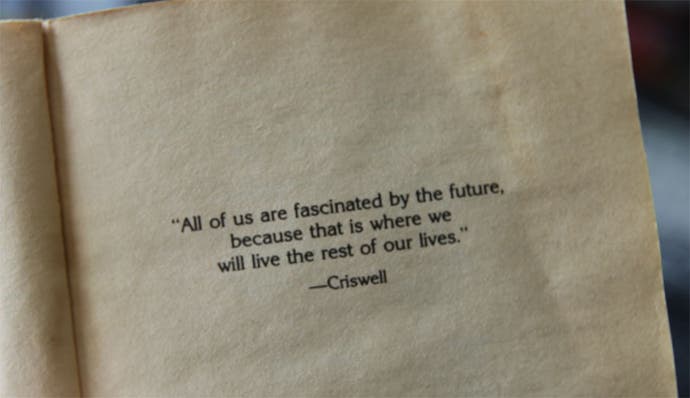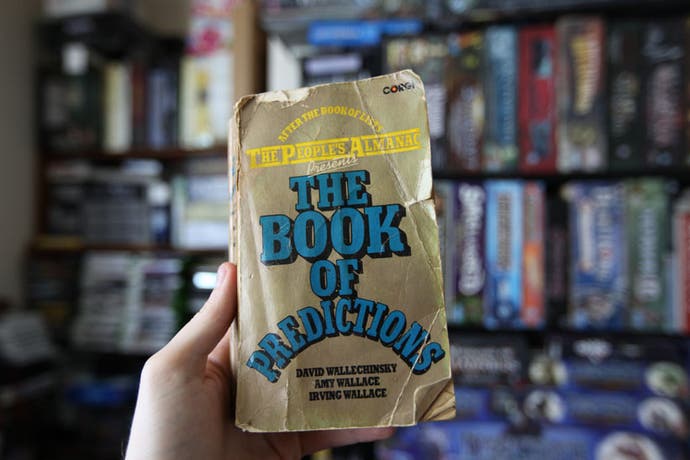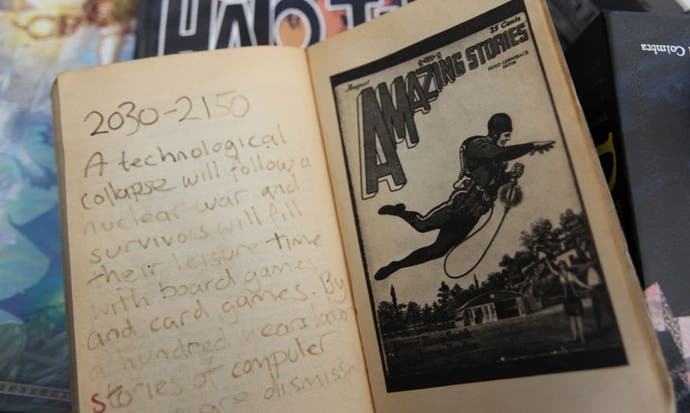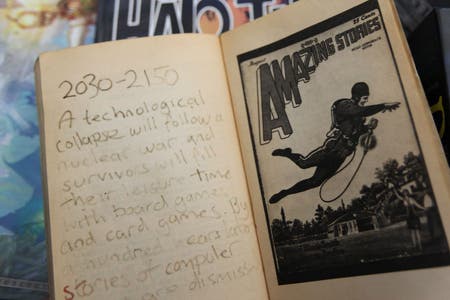Lost Humanity 9: Book of Predictions
Rob Florence predicts the future and you can too!
When I was a young boy, I bought a book from a jumble sale.
It was called "The People's Almanac Presents The Book Of Predictions". It was published in 1981, and so was already a little bit out of date by the time I first read it, in 1986. I say "first read it" because I've kept this book all my life and revisit it every few years. I've read it more often than I've read any other book.
It opens with a quote from Criswell.
"All of us are fascinated by the future, because that is where we will live the rest of our lives."
If you don't know who Criswell is, he was an American stage psychic who was a pal of Ed Wood. He was known for his poor predictions, and I didn't initially realise how perfect his inclusion at the start of the book would turn out to be. It's a giant tome of wrong.

But let's start with the good stuff. Predictor Nicholas Johnson, who was chairman of the National Citizens Communications Lobby at the time the book went to print, wrote about: "Audience Creation. There will continue to be an increase in the quantity of audio and video material created by the audience (as well as edited by them)..."
Also, this: "Material will continue increasingly to be available at the time a member of the audience wants it rather than at the time the broadcaster wishes to distribute it."
Cool, right? So he saw it all coming in 1981. YouTube, iPlayer, all of that. Nice. It's not like he predicted that a race of Wraithlords would emerge from a portal behind Simon Cowell's eye during an episode of X-Factor or anything, but it's still nice.
Martin Abramson, a sports writer for Playboy, Cosmopolitan and such, predicted this for our time: "As electronic games featuring sports become ever more sophisticated and advanced, professional leagues will be formed. Their members will play games at home, competing with others who also play in their homes, via electronic and cable connections."
And with that sensible prediction, in this 500-page book from 1981, all references to electronic games are complete. Amazing, right? In a book published in 1981, when Pac-Man mania was everywhere, there is only one prediction directly related to electronic gaming. No room for predictions about where gaming is going, but plenty of room for madness like this:
FREDRICK DAVIES: "Fidel Castro will host a world syndicated TV series."
At nine years old, I found it weird that there was no video game predictions in the book. Games were my life. Games were all me and my friends ever talked about. And what were we always talking about? The same thing we always talk about these days. The future! So you know what I did? I wrote some predictions of my own in the blank pages at the back of the book.

For the first time since they were written in late 1986, I reveal my predictions for the future of the games industry. Predictions from the mind of a nine-year-old boy. I will also make some notes beside each one, and state whether or not they came true. Enjoy. And please share some predictions of your own in the comments section. We'll revisit them someday.
Robert Florence (age 9) predicts
1990: Commodore buys Spectrum.
This is beautiful. I love that my predictions begin with a bit of old-fashioned Commodore-Speccy rivalry. A definitive "THE WAR WILL BE OVER IN FOUR YEARS" statement from a little C64 nut. The Speccy did die, crushed underfoot by the glorious march of the majestic and mighty C64, but Commodore didn't buy it. So I was...
WRONG
1992: Commodore will bring out a computer that can do games that look like Dragon's Lair.
It's important that you understand the impact Dragon's Lair had on kids back in the 80s. Seeing that machine in an arcade was a jaw-dropper of a moment for sure. Kids don't get super-analytical about gameplay, so I remember my friends and I going bananas about this thing. And, to be fair, the Commodore Amiga version of the game came close to the look of Dragon's Lair. Well, close-ish. And there was an Amiga 1200 released in 1992. Should I count this as correct? No, I'll be super-harsh and say...
WRONG
1995: Every kid will have a computer in the living room of their house, and schools will do lessons about making games.
I couldn't envisage any kind of future where gaming wasn't the main focus of entertainment in the home. If every living room already had a TV, with its boring Thorn Birds adaptations and boring Minder, then surely every living room will eventually have an awesome computer? I think the second part comes from wanting to learn how to make games myself. I hated school, and spent my days in the classroom dreaming about creative stuff. I barely remember even getting to use the school's BBC computer. I spent more time at school mass services than at a computer keyboard, and that's a whole shitload of wrong right there. I was dreaming of a better future. It didn't happen, and still hasn't happened, sadly.
WRONG

2000: Games get so real that people go to watch people play them in the pictures.
In Glasgow many of us call the cinema "the pictures". I've predicted here that games would become so advanced that distributors would screen someone playing through them in cinemas, and people would pay to passively watch the game unfold. I predicted this would happen in the year 2000, the year the PS2 launched. How exactly did I expect this to work? Would there be a "player" in every cinema, controlling the game? How long would the game be? The length of a film? Or would people be paying to watch a 20-hour long thing? How much would you have to charge people to make a 20-hour cinema session profitable? What if the player got stuck? Can you imagine having paid to watch someone play PS2 launch title Orphen: Scion of Sorcery? This prediction is Fidel Castro TV Show level garbage, and a prime example of how stupid kids are.
WRONG
2010: New computers will play every game that currently exists. One computer will give you access to every game by paying a computer version of a TV license.
I'm actually really impressed with this one. It's kinda like subscription-based cloud gaming, isn't it? I think it proves that this idea has always floated around in one form or another, because gamers always want a constant stream of new stuff and hate hassle and love sitting in the house doing f*** all. In truth, I was more impressed with this prediction before OnLive's troubles became clear last week. That took the shine off a little bit. But cloud gaming is going to be a thing, I think. We're just not there yet. And I'm being harsh, so I will punish myself for getting the timings wrong.
WRONG
2030 - 2150: A technological collapse will follow a nuclear war and survivors will fill their leisure time with board games and card games. By a hundred years later stories of computer games are dismissed as myths.
Wow. Okay. To any young people out there reading this - when people of my age were kids, we expected a nuclear war. In the UK, many of us had seen a devastating TV drama called "Threads". It depicted the effects of a nuclear attack on the UK from the perspective of working class people in Sheffield, England. This thing haunted my generation. It was British drama at its best - bleak and honest and utterly terrifying. And here's the thing - I think everybody thought that it would happen, eventually. How could it not? So, as you can see, any predictions we made in those days had to factor in the inevitable Nuclear War. It's actually a lovely thing to realise that my daughter won't grow up with that same sense of impending doom.
I also love this prediction because it tells you how I felt, and feel, about computer games. Wondrous things. Magical things. So magical that if it all suddenly stopped one day, if some disaster happened that made it impossible for these things to function, no-one would believe they ever existed.
"We created these incredible devices. Incredible feats of engineering and design. And we played with them. That's all. We used them as toys. We used them to connect with people on the other side of the world, so that we could share our toys with strangers."
In a world beyond the bomb, scratching for survival every day, you'd believe that paradise bullshit? No way.
PROBABLY RIGHT

